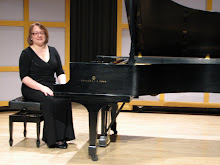During the recording sessions I learned something about how my mind works. My producer's usual procedure has been that once the first take has been recorded he gives me comments and feedback on how he heard it and what he'd like to focus on in the next take. He's a man of great precision and detail, which is absolutely needed in his line of work, so he would give me very specific tasks to focus on at specific times in the music.
I started to notice a pattern in my own response to this method. Generally, my first take would be somewhat exploratory and even a little hesitant, and perhaps a chance to remind myself of the possibilities of the piece which I had usually not played in a couple of days, due to the structure of the recording schedule. This means that I would be in a "right-brain" mode while playing the first take, but not necessarily fully at home. I noticed that in taking in the producer's comments, I would start to get more into "left-brain" mode, thinking more than feeling. Invariably, the second take would not go as well as I habitually play, as my mind would be distracted with thinking and judging in a more micro way.
As an experiment, I suggested playing the first two takes without any commentary from the recording booth, no matter what. I really started to feel more successful immediately, as I was able to play much more from that place of "flow" that is the subject of Mihaly Csikszentmihalyi's book, aptly titled "Flow". Enjoyment and concentration. Joy and focus: a combination that I have discovered might well be the antidote to Doubt!
Now, as I listen to the takes recorded a few weeks ago, I hear the wisdom of altering our process during the sessions. The first take often offers something special and magical, although not always as convincing as subsequent takes. I hear that as I progress through the recording days, the second takes become more interesting and less self-conscious than at the beginning of the sessions.






This is interesting. I can absolutely see that being analytical when what you're aiming for is to be intuitive would be counterproductive and that the critical part has to come later.
ReplyDeleteIt reminds me of the ways different conductors work with (good amateur) orchestras. It's not quite the same phenomenon, but hopefully the connection will be clear.
The best of them know what the players can do, trust them to do it, and lead them into engaging with the music. They allow the orchestra to see what's wanted and to move towards it. Others aren't able to do that, spend more time talking about how the music should go than showing how it should go, and create a distance between the players and the music.
As an extreme example, one conductor I know will stop the orchestra every few bars, asking for various fine details, many of which are indicated in the music. The frustrating thing is that at least 50% of the things he asks for would happen automatically if the orchestra were familiar with the context. They would do the big dramatic sforzando, because they'd experienced the build-up of the piece to that dramatic moment and could hardly not do it.
The feeling that creates is that we carefully follow his instructions, and out comes the performance, but it's not us performing it. We're not allowed to get our hands on the music. And so the orchestra never plays at its best for that particular conductor. And ironically, many of the things he stops to fix are caused by the fact that he stops so much, stopping us getting the context.
What you seem to me to be saying is that when you're recording, your first need is to be free to engage with the music, and that too much analysis too soon begins to get in the way. A different situation on a different timescale, but maybe the same principle?
It reminds me too of a book called The Inner Game of Music by Barry Green, which is about ways of removing the distractions from playing in order to just play; analysis while playing being one of the potential obstacles.
Another great book that I'm reminded of is Free Play by Stephen Nachmanovitch; give it a look!
ReplyDelete